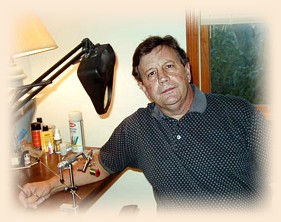Tom Tickler appears to be a childrens game that was played in the
1700s in Great Britain. It went by other names as well, and these
days we would call it "tag". The person who was "it" was Tom
Tickler, and I would imagine there was some tickling involved when
tagging a player. How this relates to salmon fishing is something of a
mystery, but we've all had a fly that we thought, if only for a very short
period of time, was "it".
I've been working quite hard on these flies of late, trying for a
simpler, more elegant, sleeker look, flies that could actually be
fished to some degree rather than ones that demonstrate some
great technical ability or other. The first iteration I did of this one
was NOT what I had in mind, and I'll show it here if only to discuss
some of its shortcomings. What I was going for was an old fashioned
mixed wing look, which involves a lot of single strands thrown together,
something I'm instinctively incapable of doing, so I just marry them.
Here's the fly, I'll go on to explain what I didn't like.

The look I was trying to get with this fly was a low-set mixed wing,
with well-ordered body hackle similar to that shown in old engravings
of these flies from books done in the 1800s, and above all a small,
good looking head. I've stopped using any tricks at all like faux hackle
to fill in spots behind the wing, and glue of any kind to stabilize things
at the head. So a larger head many times results, or one that has a shape
I don't prefer. The wax I use adds a bit to the bulk. I was happy with
the size of the head, it's quite small so my attention to thread wraps
there really paid off, but was not in love with the shape. The wing,
while OK, wound up being higher than I wanted, though just a bit.
All in all, I would have probably killed to do this fly six months ago,
but I've been trying to take these to the next level, and this fly wasn't
there, or at least wasn't at my perception of there. Oh yeah, I hated
the throat too, and it was too long.
To make matters worse, I found some flies on-line by a marvelous
fly dresser from England, Paul Little, and there in all its splendor
was a Tom Tickler, infinitely superior to mine. Paul Little is the
master of simple elegance, and the influence of a great American
fly dresser Marvin Nolte is there, but understated. So the result
of my exposure to Paul's version of the fly is up on the top of the
page, one I'm quite happy with, though it has short comings as well,
as do most flies if you really look. It's in no way a copy of Paul's,
completely different actually right down to the recipe itself, but the
simple elegance I was looking for is there in the end. The head's
not so bad either, I'd love to do that one every time out.
We all have influences and people whose work inspires us.
Mine seem endless to me at times, but that's what keeps it
interesting and keeps us going. There are so many very good
fly tiers around, it can at times be disheartening to look at
something you've done and compare it with others. But it's
the only way to get better yourself, and I think that good fly
tying of any sort is a journey that entails constant renewal. I
hope you'll give the Tom Tickler a go, it's a good, no-nonsense,
basic salmon fly that demands your complete attention. Here's the
recipe I used from Hardy:
Tom Tickler
from John James Hardy's Salmon Fishing:
Tag: Silver tinsel and blue floss
Tail: A topping
Butt: Black ostrich herl
Body: Orange floss
Ribs: Gold tinsel
Hackle: Orange
Throat: Blue hackle and guinea fowl
Wings: Golden pheasant tail; Red swan; Bustard
Horns: Blue macaw
Head: Black
Credits:
Salmon Fishing by John James Hardy; Fishing by H. Cholmondeley Pennell; ~ EA
About Eric:
 Eric lives in Delaware, Ohio and fishes for brown trout in
the Mad River, a beautiful spring creek. More of his flies
are on display here:
Eric lives in Delaware, Ohio and fishes for brown trout in
the Mad River, a beautiful spring creek. More of his flies
are on display here:
|





